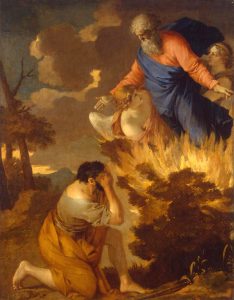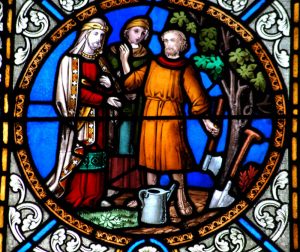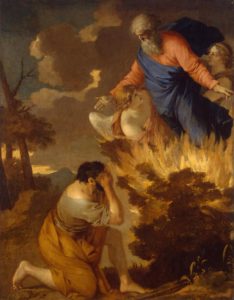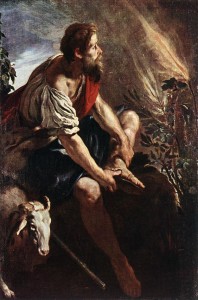Thoughts on Sunday’s Lessons for March 23, 2025 (Lent 3C)

Moses and the Burning Bush (1642-45), oil painting on canvas by Sébastien Bourdon (1616-1671). The State Hermitage Museum, St. Petersburg, Russia. (Click image to enlarge.)
First Reading: Exodus 3:1-15
As the theologian Marcus Borg famously wrote, God is both right here and out there: as near as our thoughts and as far as the stars. Sunday’s readings stretch our imagination with ideas of a transcendent God of mighty power. In our first reading from Exodus, we recall the ancestral story of God addressing a startled Moses from a flaming bush that burned but was never consumed. The people have suffered in slavery in Egypt long enough, God tells Moses, calling Moses – despite his protests of inadequacy – to lead the people out of Egypt and bring them to a promised land flowing with milk and honey.
Psalm: Psalm 63:1-8
We began Lent by recalling the 40 days that Jesus spent in the desert, defying temptation and preparing for his ministry on Earth. Psalm 63 is set in a similar arid wilderness, a barren and dry land where there is no water. The Psalmist seeks God with a thirsty soul, aching not only for liquid refreshment but for God, whose lovingkindness is better than life itself. Through prayer, the Psalmist’s hunger is satisfied. Upheld by God’s strong hand, the poet sings for joy under the shadow of God’s wings.
Second Reading: 1 Corinthians 10:1-13
Paul, writing to the people of Corinth in a time when early Christians were still working out their relationship with Judaism, recalls Hebrew Bible stories in which Israelites were struck down for failing to keep God’s ways. Paul holds up these Israelites who strayed from their commitments as examples for the early Christians to consider when they felt that God was testing them with hard times. Learn from those ancestors, Paul urges. Be faithful, don’t stray, and know that when hard times test us, God will provide us strength.
Gospel: Luke 13:1-9
A group of people came to Jesus, worried about a group of Galileans whom Pilate had killed and 18 others who died when a tower at Siloam fell on them. Did these bad things happen because the victims had sinned? Absolutely not, Jesus tells them. God does not punish sin with suffering, Jesus declares, perhaps recalling the wisdom of Job. But, Jesus goes on, repentance defeats death, bringing forgiveness and eternal life. Like the gardener who defers cutting down a barren fig tree to nurture it in hope it will eventually bear fruit, we are to hope for forgiveness and another chance.




